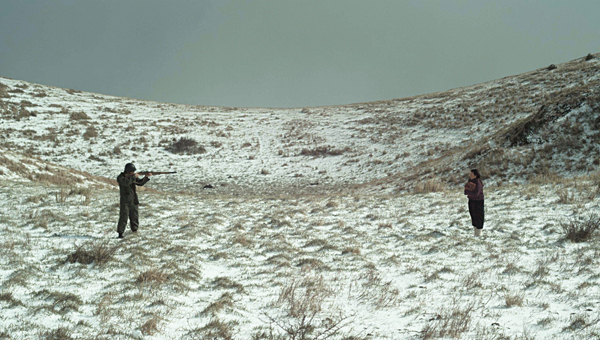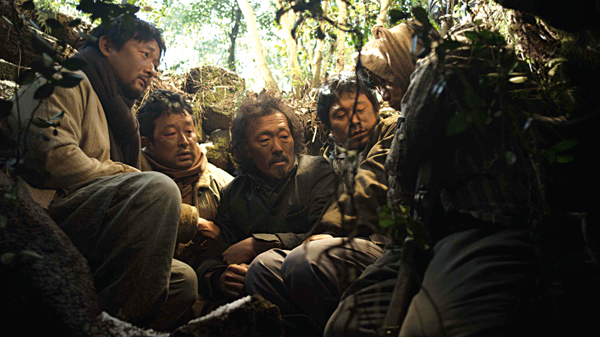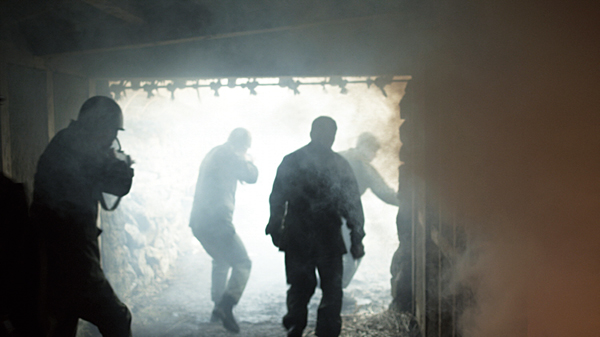| |
 |
|
O Muel’s Jiseul portrayed to an international audience ordinary people’s lives during the 4.3 Massacre. Photo Courtesy Japari Film
|
Many years have passed since one of the most tragic events in Korean history swept across Jeju Island. The 4.3 Massacre, also known simply as “sa sam,” claimed more than 14 thousand mostly innocent lives, according to official Korean government figures. (Some activists put the figure as high as 60 thousand.) The killings were committed under a policy of “driving out communists” and other resistance forces on the island. Not only lives, but also bonds of trust between communities were destroyed.
Virtually the whole island was ripped apart. When the tragedy was over the government buried the atrocity into history, feigning ignorance, and Jeju Islanders buried their pain deep down in their soul, muted, terrified, as if speaking of it would start the misery all over again.
Now, the massacre itself is slowly beginning to fade. As generations passed, it was rarely openly discussed and deemed politically sensitive. Also, as long as those who experienced the incident are still alive, it has been difficult to objectively reflect on the event. However, among all these political and practical perspectives, what is easily overlooked but crucially important is the story of the “people.”
Apart from the military, policemen or the rebels, those who were brutally murdered were Jeju Islanders. Their story must be heard. To them the 4.3 Massacre was not an ideological feud. To them it was the crumbling of everyday life leaving them with excruciating pain and sorrow. By seeing it this way, we truly understand why it should never happen again. This brings me to “Jiseul,” a movie which tells a story that should have been told a long time ago.
| |
 |
|
|
O Muel’s Jiseul portrayed to an international audience ordinary people’s lives during the 4.3 Massacre. Photo Courtesy Japari Film
|
In the movie, a couple of households go to a mountain cave to hide for a few days until the commotion in their village passes. They have very little food or belongings with them. The families chat merrily, sometimes worrying about a daughter or livestock left behind. They don’t seem to know anything about communism, or even why soldiers have come to their village. What they do know is, everything is going to be over soon.
Despite their expectations, the days in the cave get longer and longer. The military is burning down houses, slaughtering villagers, raping women. Those who have gone down the mountain to seek others find their loved ones dead. One, caught by the military, tells of the cave location in the naive belief that the soldiers will help - not knowing that death alone awaits him and the others.
Even during such a hard and miserable time there is something to lighten the mood and cheer people up. “Jiseul” (potato in Jeju dialect), is shared between the people. A mother grasps a basket of jiseul, thinking of how starving her son must be in the cave. A soldier hands jiseul to another soldier who is tormented by their superior’s orders. The jiseul are not just food, they are love, the only remaining humanity when all morals and justice have gone.
The touching and disturbing scenes of Jiseul leave a profound impact on the audience. Watching visualized scenes of the massacre is much more shocking than reading documents about the incident.
This reminded me of research my team and I conducted last year. While doing research on the 4.3 Massacre I realized one thing: to gain even the slightest understanding of what happened, perceiving is not enough. As generations who have never experienced such an incident, we can barely comprehend it just by ‘knowing’. Rather, we should ‘empathize’ with the islanders.
We must get into the shoes of the people who went up the mountain and had absolutely no knowledge of what would happen in the end. And only after empathizing can we slowly understand the essential reason why this incident should never be repeated: the massacre disregarded people’s lives and wretchedly trampled on human rights.
| |
 |
|
|
O Muel’s Jiseul portrayed to an international audience ordinary people’s lives during the 4.3 Massacre. Photo Courtesy Japari Film
|
However, from a political point of view, all this is just another historic event, a compilation of facts and individuals. In this respect, Jiseul gives us the perfect opportunity to stand a step closer to the Jeju people and realize the true sig-nificance of the event.
Jiseul allows us to reflect on Jeju as the ‘Island of World Peace’. Somehow, the ‘world peace’ in that slogan has come to mean a “Miss Universe” of peace - yet, world peace is not about beautiful scenery. In Jeju, it comes from extending the lessons learned from the 4.3 Massacre.
Lessons like, “true peace is not fighting one another for ideological differences” and, “basic human rights are the greatest value we must pursue at all times.” These morals aren’t just lessons that should have been learned at the time of the incident, they are still valid today and should be universally applied.
By imparting them, Jeju Island can take part in establishing world peace. In the end, for this island to be an “Island of World Peace,” it should be a place where people always remember the victims of the 4.3 Massacre and share jiseul with one another.
|






















